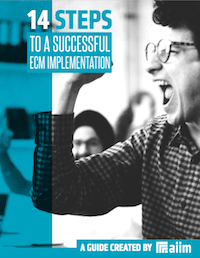The AIIM Blog
Keep your finger on the pulse of Intelligent Information Management with industry news, trends, and best practices.
Document Management | Information Governance | Intelligent Information Management (IIM)
As information professionals, we're constantly asked to do more with less. More data to manage, more systems to navigate, more stakeholders to satisfy—all while working with limited resources. Sound familiar? Here's what I've learned after 15 years blending web development, archival expertise, and information management: the real value isn't in being an expert in just one domain. It's in the multidisciplinary nature of bringing multiple skill sets to the table.
Share
Artificial Intelligence (AI) | Intelligent Document Processing | Intelligent Information Management (IIM)
Earlier this week, I had the privilege of closing out the AI+IM Regional Exchange in Johannesburg, South Africa on February 3, 2026. Hosted by AIIM Training Partner COR Concepts and sponsored by Metrofile, this one-day intensive brought together 50+ practitioners to tackle the real challenges of AI data readiness, intelligent document processing, and information management strategy. Here are some of my key takeaways.
Share

Making an ECM implementation successful requires planning and attention to detail. The best way to create the right solution is to identify organizational goals and priorities. Learn how to manage a successful implementation in our free guide.
Cloud | Information Security | Intelligent Information Management (IIM)
As information professionals navigate the rapidly evolving technological landscape, the democratization of technology — particularly cloud services — presents both opportunities and significant challenges. With AI accelerating this trend, it's more important than ever to approach technology decisions with a strategic mindset.
Share
Artificial Intelligence (AI) | Information Governance | Intelligent Information Management (IIM)
Throughout my career in information governance, information management, and data governance, I've contributed to the development of industry frameworks and bodies of knowledge. These structured approaches help organizations navigate complex challenges and reduce risk. As AI reshapes our information landscape, it's worth examining how our existing frameworks should evolve.
Share
Artificial Intelligence (AI) | Intelligent Information Management (IIM) | Privacy
Organizations today face a critical balancing act: leveraging the transformative power of AI while protecting individual privacy and maintaining regulatory compliance. This challenge touches the heart of information governance, and therefore, requires thoughtful consideration.
Share
Artificial Intelligence (AI) | Data Management | Information Governance | Intelligent Information Management (IIM)
One of the most common questions I ask clients about their AI implementations is: How clean does your dirty data need to be to actually invest in AI? This question strikes at the heart of a critical consideration for any AI project.
Share